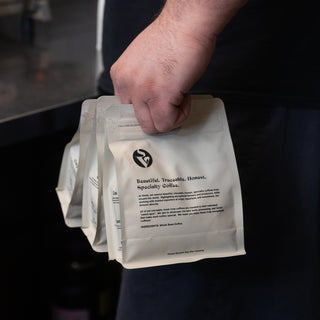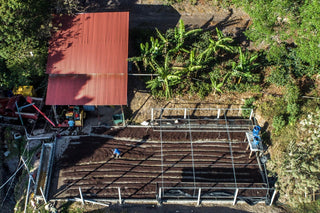We couldn’t be more excited to be featuring three coffees from Costa Rica at Vesta Coffee Roasters. We have had a long standing relationship with Carlos Montero, from Costa Rica, which we incidentally, use a lot of for our cold brew production. Now featuring two anaerobic process coffees, one of which is produced by Carlos Montero’s son, Jacob Montero, and the other from Javier Solis.
Carlos comes from a long line of farmers. His grandparents worked on a coffee farm, his father managed a farm, and Carlos grew up in the fields. He saw the struggles that his father and countless other families experienced, so he set out to experience seeing the world. He always knew he wanted to come back home and continue the family farming tradition, but he wanted to do it on his own terms. After working in restaurants in the United States for a few years, he was able to save up and buy a farm of his own.
After he returned to Costa Rica and bought his first farm, he settled down with his wife and three children who are also following in the farming footsteps of the generations before. Today, Carlos is a visionary and a leader in the specialty coffee movement in Tarrazu, and has many other farms looking to him for guidance on quality, relationships, and prices.
 Carlos Montero walking through one of his lots
Carlos Montero walking through one of his lots
The Guadalupe, or “Papa” lot, is the one that Carlos holds most dear to himself. It was the first farm that Carlos’s father and mother were able to collectively purchase and call their own. The lot is located in the middle of the farm, and in many ways can be called the heart of his land.
In his trusty 70s white Chevy, Carlos drives up the La Pastora mountain to measure the extremely ripe and well selected pickings using a traditionally Costa Rican measuring tool called a cajuela. The coffee is then accounted for, piled up, and secured to the bed of the truck ready to make the trip down the mountain to the Don Eli wet mill. Typically, the coffee will be processed on the same day that it is delivered, but oftentimes the cherries are allowed to rest in the tiled receiving tank in the cool of the night where a bit of a controlled fermentation takes place.
Jacob, Carlos’s son, uses a pump to recycle the water which moves the coffee through a depulping machine. Jacob watches with a careful eye as the cherries line up to be depulped and run through a demucilager at the end of their pulping machine. He chooses to leave all of the mucilage remaining on the seeds as they dry. He believes that this augments a complex, coating body and delightful sweetness to this particular lot that they have.
 Carlos in his trusty ol’ 70s white Chevy pick-up
Carlos in his trusty ol’ 70s white Chevy pick-up
Once the seeds have been processed with some mucilage still intact, the coffee is moved to raised beds which lay under a plastic canopy that protects them from any rain and also diffuses the direct sunlight overhead. Carlos, Jacob, and their right hand man, Evelio, make certain to constantly turn the parchment about every hour during the day. When the coffee has reached it’s optimal moisture content the parchment turns a deep red color. Evelio packs up the parchment off of the beds where it rests in the Don Eli warehouse for between 1-2 months. Finally, Carlos transports the the coffee to the dry mill to prepare it for export.
Jacob Montero’s Anibal lot is a subsection of a farm located on the southern hills of El Llano de la Piedra. The lot, which is named after one of Carlos’s brothers, was initially empty when Carlos and his Father bought it together in the late 80’s. After receiving a loan, the Montero family was able to begin planting coffee plants, and soon were able to pay the loan with money made from the farm. Carlos decided to begin focusing on producing apples at La Pastora, but soon after bought the lot back from his brothers and began his own production. Today, the farm is 1 hectare planted with 7,000 catuai trees. The great soil and share from the bananas, citrus, mangoes, and poros gives the lot an advantage in long term health and cup results. The nearby Pirris River Valley provides the right exposure to light and a consistent breeze.

Jacob Montero with drying beds
This is Jacob Montero’s first experiment with the Anaerobic Process. Liquid is taken from another coffee fermentation and is placed along with the cherries in barrels for 72 hours. The liquid yeast jumpstarts the fermentation process allowing it to ferment faster. Once that coffee has gone through the anaerobic process, the cherries are put out to dry on raised beds covered closely by a plastic canopy, similar to a natural processed coffee. To avoid over-fermentation the coffee is dried in a thin layer and moved by Evelio about every two hours. It takes roughly 20 days until the coffee is dried to it’s optimal moisture content.
Our third featured coffee is also an anaerobic process by Javier Solis. Javier’s father Alfonso Solis spends most of his time in the mountain by their home in the small town of Santa Maria. He grows various fruits in his and his families farms surrounded by blackberries, tomatoes, cas, and coffee. The national institution of electricity, ICE, has various programs to help farmers which the Solis family has used to grow coffee at their farm which also creates a hospitable habitat for all of their crops.

Coffee became a more profitable fruit to grow in their farm, which led to the creation of Cedral. Cedral, which means cedar tree in Spanish, was overrun by cedar trees in the past, but in the mid 1900’s a large company from Spain came to the area and cut down the trees where the farm resides today. It’s promising to see the Solis family replanting and farming sustainably to recuperate the land. The micro climate, coupled with the habitat created by planting various other plants produces excellent coffees. The high altitude, great cloud coverage, strong sun rays, wind movement and frequent rains lend well to the young catuai plants (only 7 years old!) growing in the fertile soil of the Dota Valley.
Currently, they are able to produce about 50 bags per year, but are planning to grow into producing about 130 bags per year. At first, Alfonso was only interested in producing his coffee in order to deliver it to the cooperative nearby, but his son, Javier, persuaded him to take the risk of processing all of their own coffee. Javier is extremely passionate about specialty coffee and loves being surrounded by nature.
As with most farmers' children, Javier went to university in the city. He studied technical engineering and works as an advisor for companies all around the country, but mainly near the larger cities, during the week. When he isn’t doing his consultant work, he is back at home in Santa Maria and on the farm helping his father produce specialty coffee off of their farm.

Coffee cherries laid out in the sun on a concrete patio
Aside from having a very biodiverse farm, the Solis family does many things in the quest to manage the farm sustainably. They use spent cascara from processing on their plants as a fertilizer, but also to maintain the moisture content in the soil. The elements in their soil are not quite balanced enough to produce the coffee that they are after and are high in potassium; so they put down boron and zinc in order to foster an ideal base for the farm. Alfonso fertilizes four times a year, which is exceptional but comes at a hefty investment. They execute this after first analyzing the coffee leaves to understand what the trees need. They minimize the chemicals used on the farm and do the work to keep disease and weeds away by hand.
For this anaerobic process, they collect the best cherries and take them to a micromill where they ferment in fermentation tanks for approximately 144 hours. After they process they dry the cherries in the sun until they are at their ideal moisture content. At first, they do a pre-drying on the cement patio for 3 or 4 days. The coffee is only moved a few times throughout the day to promote additional fermentation. Then they move the semi-dry cherries to raised beds within a greenhouse where they turn the coffee more frequently - about every hour.

Coffee cherries being fermented in plastic tanks



